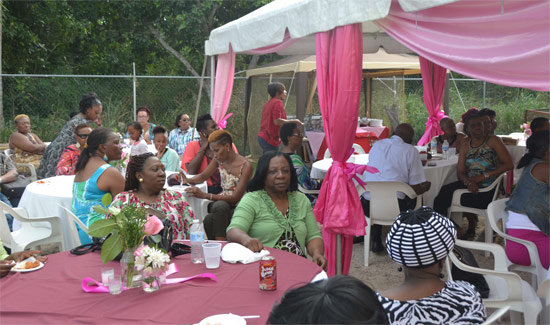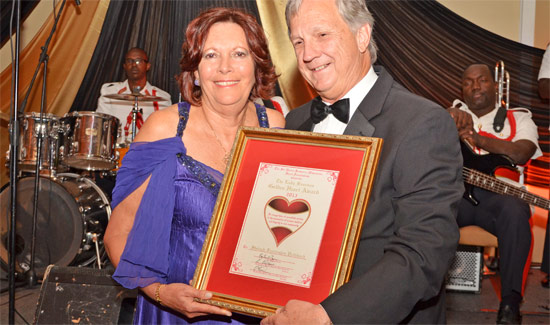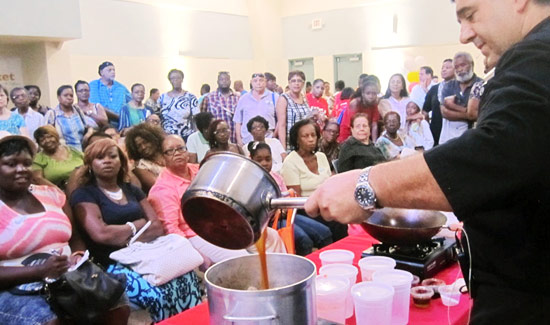 Renowned Urologist Dr. Robin Roberts has called on Bahamian males, particularly black Bahamian males, to have their prostates checked on a regular basis to save themselves from death and/or the painful challenges of living with prostate cancer.
Renowned Urologist Dr. Robin Roberts has called on Bahamian males, particularly black Bahamian males, to have their prostates checked on a regular basis to save themselves from death and/or the painful challenges of living with prostate cancer.
“Why there are still men in this country who know about prostate cancer, who know that they are at-risk to get prostate cancer and who still refuse to go and get themselves checked is beyond me,” Dr. Roberts said recently.
“Age-for-age we have a disease that occurs at an earlier onset; that when it occurs, is at a more advanced stage than when found in our Caucasian counterparts, and a disease that grows more quickly; spreads more quickly and is more likely to result in death for males of African descent and so there is no denying that it is of major significance for black men,” Dr. Roberts said.
Dr. Roberts said “one of the biggest advances that has happened in prostate cancer” was the introduction of the Prostate Specific Allergen (PSA) Test, which allows doctors to diagnose prostate cancer at a very early stage; yet Bahamian men still refuse to get tested.
“The PSA Test is very similar to what the Pap Smear Test has done for women with Cervical Cancer (cancer in the womb). In the Developed Countries, the introduction of the PSA exam has caused a lot of cancers to be detected and treated that probably would not have been, and have helped dropped cancer death rates by 40 per cent over the last 20 years.
“Because of early detection and diagnosis, the amount of metastatic disease (cancer that has spread to the bone) has dropped by 75 per cent. That is not happening in the developing countries, The Bahamas included, because men are not getting tested as they should.”
Dr. Roberts said healthcare officials “have been trying for 20 years” to get Bahamian males to have their prostates examined, but men have “still not been heeding the call”.
He applauded the work of US Too Bahamas, a men’s Prostate Cancer Education, Awareness and Support Group, that has been working diligently for years with regards to education and awareness.
“If you were to ask a man here, he knows he needs to get his prostate checked; we have the free clinics, and people try to push them to come out and get it done; but they still do not come, so there must be something more to this behaviour than we think,” Dr. Roberts added.
Dr. Roberts said the “cultural differences” that exist between Black Males and their Caucasian counterparts with regards to the prevalence and aggressive nature of the disease, will be part of the research local researchers will be undertaking.
“One of the interesting things we do in our clinics is ask the men who do come in, is what was the reason for their being there. One-third say they came because of spousal influence or a friend brought them in; but very few come in on their own. We need to dig into that and be able to exploit that so that we can get the message across and they heed the call,” Dr. Roberts added.
Dr. Roberts said it is “very frustrating as a physician” to see men suffer from the disease when a check-up may have helped save their lives.
“One patient was paralyzed because of his prostate cancer spreading,” Dr. Roberts said. “You don’t see that in the developed countries. That’s something from the past and so we still are seeing men carrying the burden of this disease whom, if they had sought early diagnosis and treatment, it probably would not have happened,” Dr. Roberts added.
Dr. Roberts, who also serves as the Director of the University of West Indies School of Clinical Medicine and Research, Bahamas Campus, said there are many intangibles associated with the disease.
“We are living in a world where, because of medical advances, people are living longer lives, beyond 70 years of age,” Dr. Roberts said. “You don’t want to get afflicted with something at 50 or 60 that you could have taken care of, and have to live the rest of your life with it.
“Good health is for people to enjoy life. When prostate cancer spreads you don’t want to see that. It is one of the more tear-jerking conditions that you can witness to see someone you have loved; someone who has carried you through life, where they literally waste away in front of you because they cannot eat.
“They cannot move; they have to have tubes put in and in many instances what we are doing is just trying to make them as comfortable as we can so that they an die with some kind of dignity. That is a very painful thing to watch,” Dr. Roberts added.
By Bahamas Information Services



